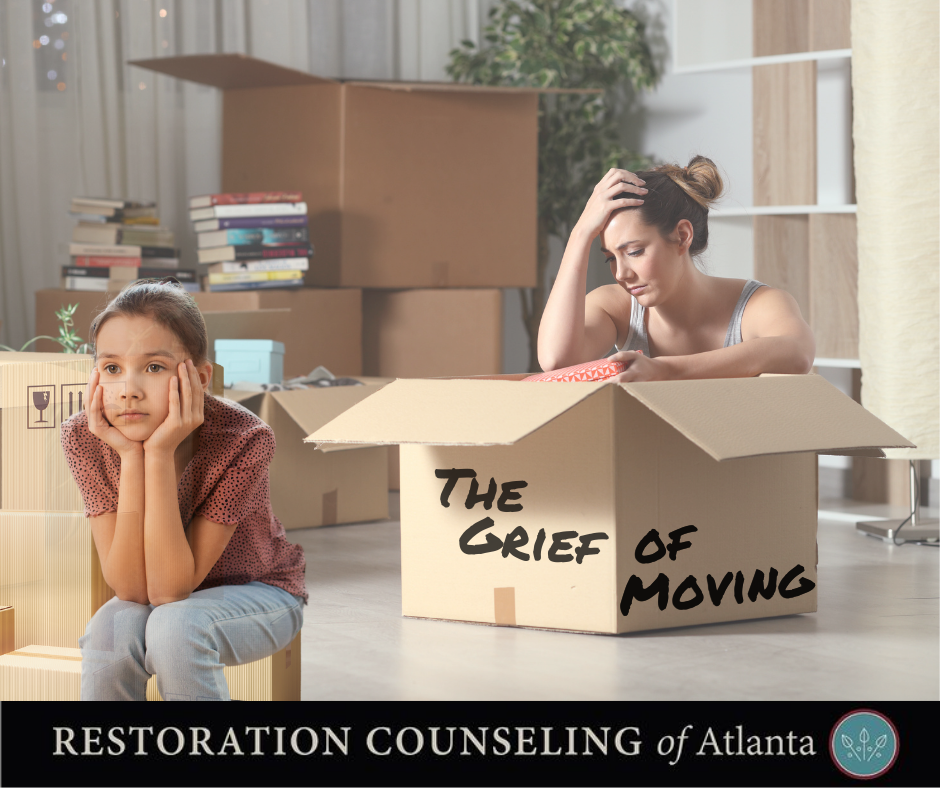Three years ago, I moved here to the Atlanta area from Philadelphia. It was a big change for my family and me. We moved from the North to the South and the city to the suburbs. There were many great things that we gained by moving here, but there was also a lot of loss. When we first moved, I remember feeling determined that I was going to enjoy every moment here; that I would not let any sense of doubt or sadness creep in. A few months after our move, we were driving to Savannah, and the roads reminded me of our yearly trek from Philadelphia to the Jersey Shore. No longer able to hold it in, I burst into tears and had to admit to my husband how much I missed Philadelphia,
Moves, near and far, bring all kinds of emotions – happiness, excitement, fear, overwhelm, sadness, and grief. We tend to think of grief mostly when a person passes away, and grief from the loss of a loved one is certainly a very particular type of grief. However, grief can occur any time there is a loss. Moving, no matter how much joy it may bring, always brings loss as well – the loss of a well lived-in home, the loss of people who were close-by, the loss of well-known streets. When we first moved, I remember feeling overwhelmed by the fact that I had to use my GPS every time I got in my car; I couldn’t wait for the day that I could just get in my car and drive.
I wonder how often we acknowledge and process the grief that comes with moving. I’d argue that our culture does not process grief or pain well. And when moving is generally viewed as a good thing, why would we bring up grief? I think about how long it took me to acknowledge my own grief after moving, and I imagine that I’m not the only one. In fact, I’ve talked to multiple people who have acknowledged the pain they feel over missing their old life, and sometimes even wondering if they made the right decision.
I can’t take away any grief you may be feeling from a move, but I can help you process the grief so that you can move through it in a healthier way. Below I’ve come up with some questions to ask yourself about your move. You can process this with a partner, write it in a journal, or both!
- What do I miss about the house/city/area that I came from?
- What are my favorite memories from my previous city or home?
- When does my grief tend to show up?
- What does my grief sound like in my thoughts?
- Where does grief show up in my body (tired, tight chest, etc)?
- How can I tend to or honor my grief when it shows up?
Once you have tended to your grief, you can help bring yourself into your present life by asking the following questions:
- What did I gain by moving?
- What personal values does my move let me live into?
- What are some things I can do or try in my new home/city to help me connect to it more?
There is nothing like the gift of time that lets you move through the pain of whatever you left behind. Three years in, I’m grateful to say that I can get into my car often without having to turn on my GPS (unless I’m trying to avoid Atlanta traffic!). Currently, I’m enjoying all of the spring blooms and noting which are the same and which are different from spring in Philadelphia. I still miss Philadelphia, and when I go back it brings a sense of home that I haven’t quite fully captured here yet. When the grief comes, as it still does every now and again, I allow myself to move through it. But then I step outside or go to my son’s baseball game or step into a session with a client, and I allow myself to be fully present in the amazing experiences I’m having right now.
 Written by Ashley Skinner, MA, APC
Written by Ashley Skinner, MA, APC
Woodstock Location
ashley@restorationcounselingatl.com ext 119
Ashley takes a multi-theory approach to psychotherapy. This allows her to take the whole person into account – mind, body, and soul. Her emphasis is on Cognitive-Behavioral Therapy, Narrative Therapy, and mindfulness techniques. She works with individuals ages 18 and up, dealing with anxiety and/or depression, postpartum anxiety and/or depression, trauma, abuse, life transitions, self-esteem issues, and grief.

